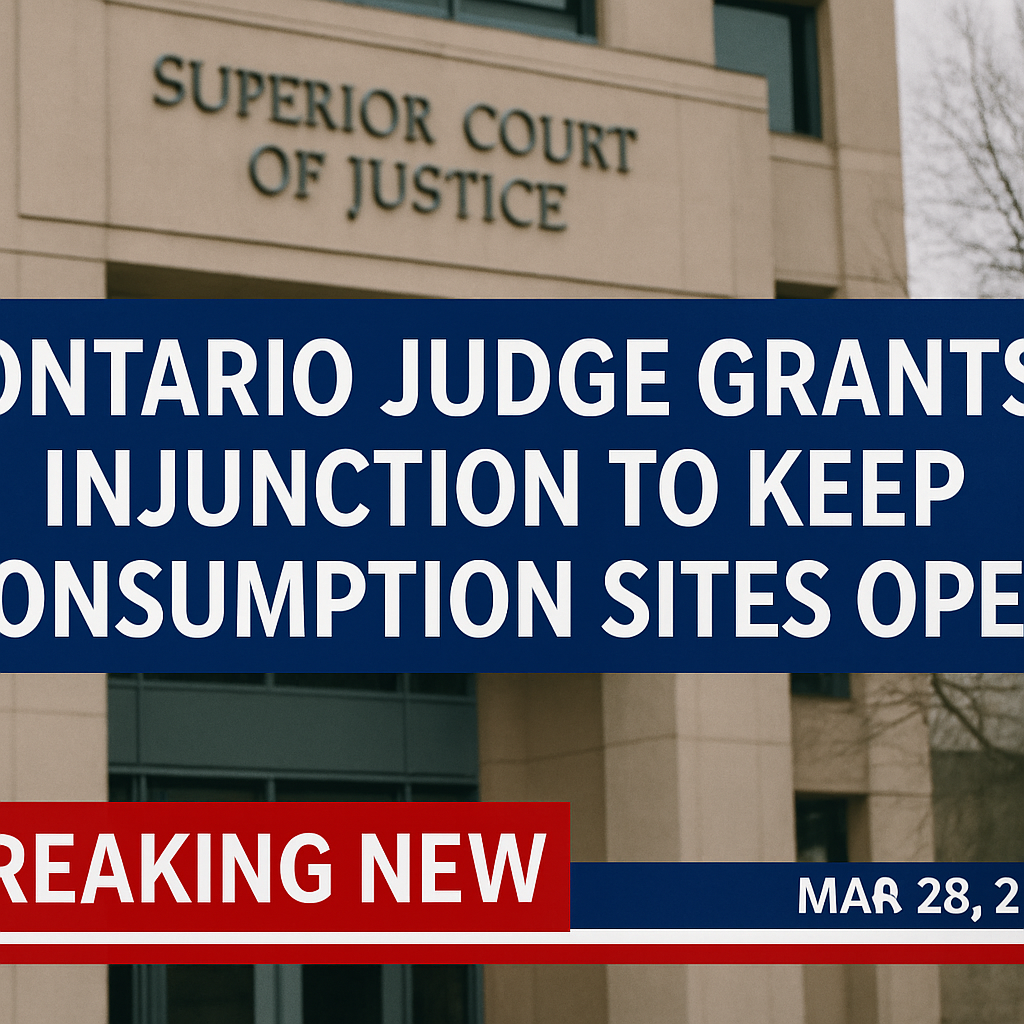An Ontario judge has temporarily blocked the closure of 10 supervised consumption sites, granting an injunction while he reviews a Charter challenge against a new provincial law. The law, which is set to take effect on April 1, bans consumption sites from operating within 200 metres of schools or daycares.
Superior Court Justice John Callaghan ruled that the consumption sites in question could remain open for up to 30 days after he delivers his decision on the case. In his ruling, Callaghan acknowledged the complexity of the constitutional issues at stake. “The constitutional issues in this application are complex,” he noted, adding that the judgment would be released in the coming months.
The legislation, passed by the provincial government last year, mandates that consumption sites located too close to schools or daycares close by April 1. The Neighbourhood Group, which operates the Kensington Market Overdose Prevention Site in Toronto, filed a lawsuit in December. The group, along with two individuals who use the site, claims that the new law infringes on their rights under the Charter of Rights and Freedoms and the Constitution, particularly the right to life, liberty, and security of the person.
The provincial government, however, argues that the new law is necessary to protect public safety, particularly children, by limiting exposure to drug use near sensitive areas like schools and daycares.
In his decision, Judge Callaghan granted an exemption for all 10 supervised consumption sites, allowing them to continue operating while he considers the case. He emphasized that the harm to individuals using the sites outweighed any potential harm caused by the continued public disorder. “Exempting the existing (supervised consumption sites) will have a substantial public benefit of preventing serious health risks and deaths,” Callaghan wrote in his ruling.
The Neighbourhood Group welcomed the decision, with lawyer Carlo Di Carlo expressing relief. “Today’s decision means people will be allowed to stay alive at least a little bit longer,” he said after the two-day court hearing earlier in the week.
The province’s new plan focuses on an abstinence-based treatment model, with 10 consumption sites set to close by April 1. Nine of these sites will be converted into Homelessness and Addiction Recovery Treatment (HART) hubs, part of a broader initiative to combat addiction. The provincial government is investing $529 million in the plan, which includes the creation of 540 supportive housing units and 18 new addiction recovery hubs across Ontario.
Despite the court’s temporary injunction, the provincial government has signaled its intent to proceed with its abstinence-based approach. A spokesperson for Health Minister Sylvia Jones indicated that funding for the new HART hubs will be contingent upon the cessation of supervised consumption services. “Our priority is to protect children and families from violent crime and dangerous public drug use occurring at drug injection sites located near schools and daycares,” said spokesperson Hannah Jensen.
The Kensington Market Overdose Prevention Site, which operates without provincial funding and relies on donations, will remain open for now. CEO Bill Sinclair expressed gratitude for the decision, stating that they had not made any plans for closure. “We’re so glad to be providing life-saving services beyond next week,” he said.
Meanwhile, the KeepSIX Consumption and Treatment Service at the South Riverdale Community Health Centre, which closed on March 21 due to the loss of funding, will remain shut. This closure follows concerns raised by local residents, especially after the tragic shooting death of 44-year-old Karolina Huebner-Makurat near the area in July 2023. The incident, involving a woman charged in connection with the shooting, led to further scrutiny of the consumption site.
Health experts and harm reduction workers have warned that the closure of these sites could lead to an increase in overdose deaths and emergency calls. However, Health Minister Sylvia Jones has maintained that the policy shift will not lead to any additional fatalities, despite growing concerns from public health advocates.



